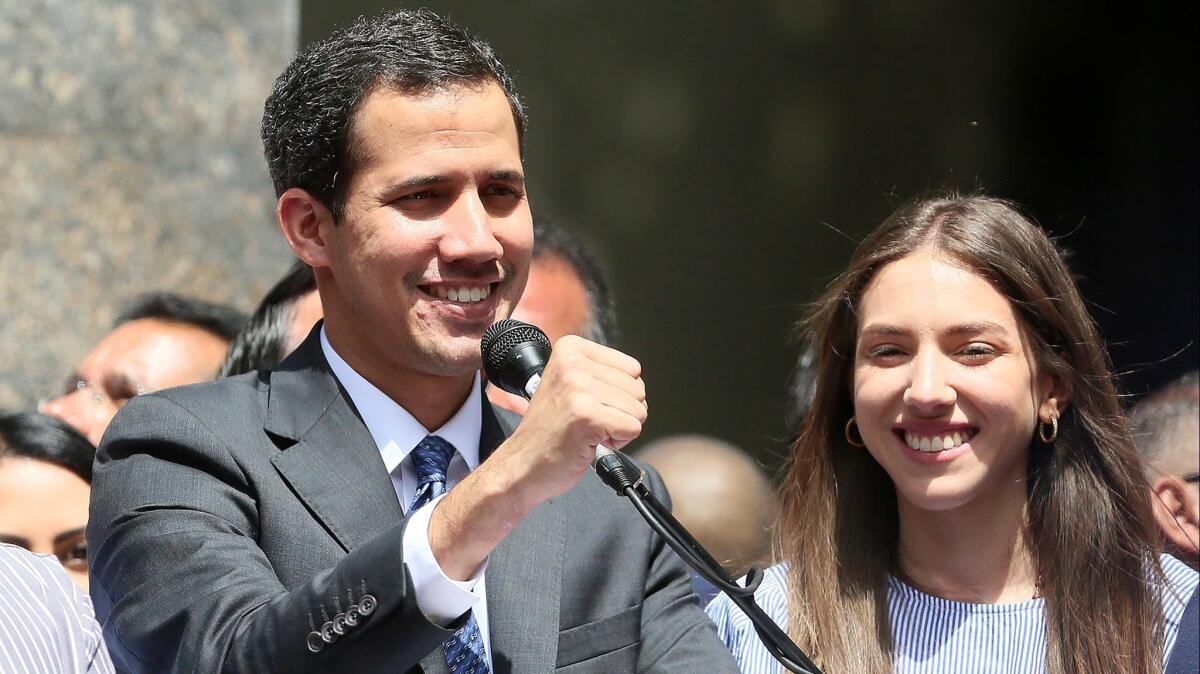Russia and China, heavily invested in Venezuela, warily watch the political turmoil
Reporting from Moscow â Venezuela and President Nicolas Maduro have been a costly investment for Russia and China as they seek to expand their influence in Latin America. And they are determined now not to lose ground.
Moscow and Beijing are warily eyeing the events in Venezuela this week, as opposition leader Juan Guaido declared himself acting president and demanded Maduro resign. The United States, along with other nations, formally recognized Guaido as the rightful president.
Maduro, a pariah in many world capitals, has been a frequent foreign dignitary guest of Russian President Vladimir Putin and Chinese President Xi Jinping. Each time, the Venezuelan walked away with new loans and fresh cash.
Over the decade ending in 2016, China loaned Venezuela approximately $62 billion, much of which Caracas could repay with oil. Moscow in the last several years gave Venezuela $17 billion in loans and investment, and in December the two governments signed a new deal in which Russia will invest $6 billion in Venezuelaâs oil and gold sectors.

China and Russia are Venezuelaâs two main creditors, and they have been the principal economic force keeping the Maduro government afloat, making the difference between solvency and bankruptcy, financial experts say.
But the two powerful nations have different attitudes toward their financial relationship with the crumbling socialist South American state.
China is more pragmatic, Russia more ideological.
For its investment, Beijing wants to receive raw materials, cheap oil and other returns. The Chinese were in fact angry with the Maduro government when its oil industry, despite the billions poured in by China, continued to decline in production and efficiency.
âWe have been watching to see if China would continue to bail out Maduro as the economy went into free-fall, and the answer is not quite,â said Ted Piccone, a senior foreign policy fellow at the Brookings Institution think tank. âIt is not a blank check.â
And in that pragmatic vein, Chinese officials have met with the Venezuelan opposition, according to Geoff Ramsey, assistant director for Venezuela at the Washington Office on Latin America, a research group in Washington.
In 2017, he said, an opposition delegation to China âoffered certain guarantees to the Chinese government that some of the deals made with the Maduro government would be respected. I donât know whether that same accommodation has been reached with the Russians.â
Russia, unlike China, is more interested in extending its military presence and setting up a beachhead in the Americas â and within spitting distance of the United States.
Late last year, two of Russiaâs most modern, nuclear-capable bombers arrived in Caracas for a short visit. Talks about building a Russian military presence in Venezuela began in 2016, a move that alarmed the U.S. The arrival of the bombers drew sharp criticism from Washington.
âThe Russian and Venezuelan people should see this for what it is: two corrupt governments squandering public funds, and squelching liberty and freedom while their people suffer,â U.S. Secretary of State Michael R. Pompeo tweeted.
For Russia, investments and military saber-rattling about protecting Venezuela has always been about showing strength in Americaâs neighborhood. Venezuela owes Moscow $3 billion for arms purchases.
The Kremlin has tried to mimic what it sees as U.S. and NATO foreign policy of entering and meddling in Moscowâs perceived sphere of influence, such as Eastern Europe and the former Soviet Union, particularly Ukraine.
Putinâs cozying up to leaders like Maduro and, before him, the late Hugo Chavez, was something of a mind meld of autocratic rulers who seem to speak the same language in terms of politics and diplomacy. It became a way for the Kremlin to show it wasnât as isolated as Washington would have the world believe.
âRussiaâs interest and investment in Venezuela is primarily geopolitical as a regional nuisance to the U.S.,â said Vladimir Frolov, an independent analyst in Moscow who focuses on Russiaâs foreign policy. âItâs an instrument for exacting certain costs on the U.S. in its home region, and a platform for distracting the U.S. from attacking Russiaâs interests where it matters most â in the former Soviet Union and Eastern Europe.â
But what is at stake now for the Kremlin, should democracy prevail in Caracas, is more than just the billions of dollars in loans, Frolov said.
âWhat is more important in this crisis are the core issues at the heart of Moscowâs view of the world order and international law,â he said. âThe loss of Venezuela is a geopolitical setback to the concept of Russia as a restored global power that needs to have client states in the U.S. backyard to prove Russiaâs great power as bona fide.â
The Kremlin sees any U.S.-condoned power takeover driven by mass protests as another version of the âcolor revolutionsâ that erupted in Ukraine, Georgia and other former Soviet republics in the mid-2000s. Those mass street protests, which Moscow blamed on U.S. meddling, led to more Western-friendly policies and governments, threatening the Kremlinâs influence.
And so Russia digs in behind Maduro and harshly criticizes the U.S. action as an unconscionable interference in the domestic affairs of a sovereign nation â a coup dâetat. Moscowâs condemnation was more forceful than that of China, who called for dialogue and a negotiated resolution to the crisis.
âAs things go south for Maduro, Russia loses access to the largest oil reserves on the planet, and it also loses a convenient toehold in the Americas, with which they can counter U.S. interest in the region,â Ramsey said.
China, already losing faith in Maduro, may remain more circumspect â and may also see opportunity in Venezuelaâs crash. Known for its predatory lending practices and tendency to seize a countryâs national assets as payment, China may be scouring for bargain-basement deals, from seaports to Venezuelaâs fields of coltan, a mineral used in the production of smartphones.
When Maduro traveled to Beijing last fall, taking pains to honor Mao Tse-tung, alarm bells went off. What else might he be willing to give away?
Special correspondent Ayres reported from Moscow and Times staff writer Wilkinson from Washington.
Twitter: @sabraayres
More to Read
Sign up for Essential California
The most important California stories and recommendations in your inbox every morning.
You may occasionally receive promotional content from the Los Angeles Times.












